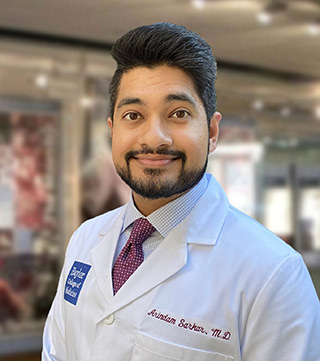March 2020 Member of the Month
Member of the Month:
Arindam Sarkar, MD
Resident embraces teaching for its challenges and rewards
By Kate Alfano
posted 03.04.20
Member of the Month Arindam Sarkar, MD, is a third-year resident at Baylor College of Medicine in Houston. He also received his medical degree from Baylor, with a concentration on genetics research. Prior to that, he received a Bachelor of Science in Biochemistry and Cell Biology and a Bachelor of Arts in Healthcare Management and Policy Studies from Rice University. He is the recipient of many scholarships, namely STFM’s Faculty for Tomorrow Scholarship (2020), AFMRD’s Advocacy Summit Scholarship (2020), TAFP’s Cassie Murphy-Cullen Scholarship (2019), and AAFP’s Family Medicine Leads Scholarship (2018) to name just a few. He is also involved in organized medicine, having served as the Texas Medical Association Resident and Fellows Section Chair and Medical Student Chair, and as TAFP’s Resident Chair.

Who or what inspired you to become a physician?
My favorite subject from sixth grade onward, unequivocally, was English. Not only could I deploy the exceptionally useless vocabulary I’d accrued through Spelling Bee competitions and being an SAT tutor, but I could compose lengthy essays and someone had to read them. How flattering as an 11-year-old to know that a college-educated professional was evaluating my thoughts, commenting on my feelings, and striving to improve my prose. To me, that demonstrated the paramount attribute of a teacher — respect for students.
Creating a fun, accessible, and enthusiastic learning environment is obviously challenging. On top of that, seeing my teachers foster community and belonging in the classroom by respecting every person’s ideas and opinions was simply inspiring. Last month, I was proud to publish my first narrative essay in Family Medicine. Without the high expectations and critical comments from my English teachers, I would have never had the confidence or interest in sharing my experiences through creative writing. Although there’s undoubtedly more to being a doctor than just its root docere — to teach — the opportunity to be like Mrs. Chapman, Shellum, or Kee is why I’m a physician.
What is your favorite part of medicine?
Teaching is definitely my most beloved feature of medicine. It is incredibly difficult to be an effective educator. Keeping up with new guidelines and articles is the easy part. Getting to know the myriad of different learning styles, personalities and interpersonal quirks of learner takes tremendous time and intent. My mentors made it appear natural and simple; it is not.
Seeing medical students graduate and pursue their own passions is very heartwarming. Naturally, I wish more of them would choose to stay and join our practice but that’s mentorship!
What is most important to you in medicine?
Serving the underserved. My mother grew up in a small village in rural India called Jara. Her brother had triglycerides in the thousands when he was 40, her father had an MI before he turned 60, and her mother’s systolics were rarely below 180. Illness and disease strike indiscriminately. In Jara, statins and electricity are both only sporadically available. When my grandmother (or dida in Bengali) died from not being able to attend dialysis sessions more than twice a month, it was devastating but unsurprising.
My mother’s distant cousin, Biley, is an apothecary in Jara. For his community, Biley serves as physician, pharmacist, cigarette dispenser, and occasional family counselor. His contributions to those families, even if sometimes outside his training, are invaluable and inspirational. As family physicians are trained in the lifespan from conception to cremation, we’re uniquely equipped to serve the Jaras of the world.
Easier said than done. While I may have completed brief humanitarian stints in undeveloped nations, I certainly prefer to inhale my 72-degree conditioned air and sleep on my Lucid king-size mattress. Fortunately, opportunities to work with underserved populations abound in Houston, and our residency clinic is a terrific example. I commend those that sacrifice comfort and safety when serving abroad, but for me, I feel service occurs every day in our hometown.
What advice would you give to medical students?
In medicine, try to be yourself and try to connect with patients to better understand them. Venture outside your comfort zone and be open to new experiences. Medicine is all about relationships. Each specialty connects with patients in different ways and tells different stories.
In life, I think we’re as young as we’ll ever be. Sign up for that marathon, get that skydiving Groupon, talk to that girl you think you have nothing in common with. You might end up the happiest person you know.
What do you enjoy doing outside of medicine?
I love television and movies for seeing ordinary people in extraordinary circumstances like Schindler’s List or The Night Of. I think that’s why I love medicine too. On a daily basis, we witness inspiring, funny, scary, and insightful stories.
TAFP’s Member of the Month program highlights Texas family physicians in TAFP News Now and on the TAFP website. We feature a biography and a Q&A with a different TAFP member each month and his or her unique approach to family medicine. If you know an outstanding family physician colleague who you think should be featured as a Member of the Month or if you’d like to tell your own story, nominate yourself or your colleague by contacting TAFP by email at tafp@tafp.org or by phone at (512) 329-8666. View past Members of the Month here.